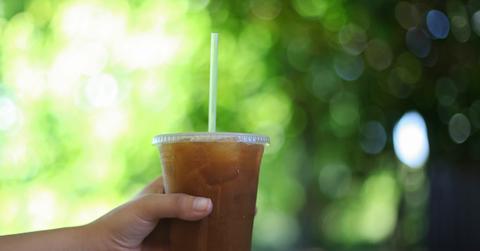This Plastic-Eating Enzyme Could Save The Planet From Pollution
While studying enzymes that are able to digest PET plastics, scientists have accidentally found a way to make the process 20 percent faster than its natural ability to cut back on waste. They're now attempting to manipulate it even further on an industrial scale.
Updated May 23 2019, 7:38 p.m. ET
Scientists in Japan have created an enzyme that’s able to eat through plastic. That's right: This enzyme might be key in eating through the planet's pollution, including plastic bottles. How does this work? This natural bacteria, formed at recycling centers, is able to digest plastics made from polyethylene terephthalate (PET), and is now able to "chew" through it more efficiently. Findings from American and British scientists were published in the Proceedings of the National Academy of Sciences on Monday.
PET has been a common choice for food and beverage packaging. It’s lightweight, can be reused after proper and careful cleaning, and is approved by the FDA. However, if these plastics are thrown away instead of recycled, they can last for centuries before breaking down. Only 25 percent of plastic produced in the United States ends up being recycled.
Since the plastic is cheap to produce, companies have shied away from recycling issues until awareness of the problem has spread in recent years. It’s also led to scientists researching phenomenons like what happened in Japan two years ago. Enzymes are able to eat through the plastic and return it back to the components its made from, which can be recycled back into plastic.
This is beneficial for two reasons. Many plastic containers can only be recycled once or twice before it’s downcycled into fabric. It can also form more of a closed-loop for fuel-based plastics; instead of using more fossil fuels, they can truly make these plastics sustainable with the enzymes.
When studying the enzyme, scientists in the United Kingdom compared it to bacteria that was able to cut down on the natural waxy, protective shield formed by plants, cutin. When manipulating it, they were able to improve the enzyme’s ability to cut through PET plastic. It had a 20 percent improvement rate over its natural power.
“Although the improvement is modest, this unanticipated discovery suggests that there is room to further improve these enzymes, moving us closer to a recycling solution for the ever-growing mountain of discarded plastics,” Professor John McGeehan of the University of Portsmouth said in a news release.
After the breakthrough, scientists are now discovering how to turn this into an large-scale solution. One way is creating a mutant enzyme capable of surviving hot temperatures capable of turning PET plastics into a thick, sludgy state between solid and liquid. According to The Guardian, this could “degrade [PET plastics] 10-100 times faster.”
Enzymes are by itself non-toxic and biodegradable, meaning they’re a safe, sustainable option to break down plastics. They’ve also been found in wax worms when a scientist left them in a plastic bag that was eventually chewed up. Other scientists warn that the process needs further evaluation and that the technology used doesn’t produce additional carbon emissions, but there’s a lot of promise ahead for removing plastic waste.
